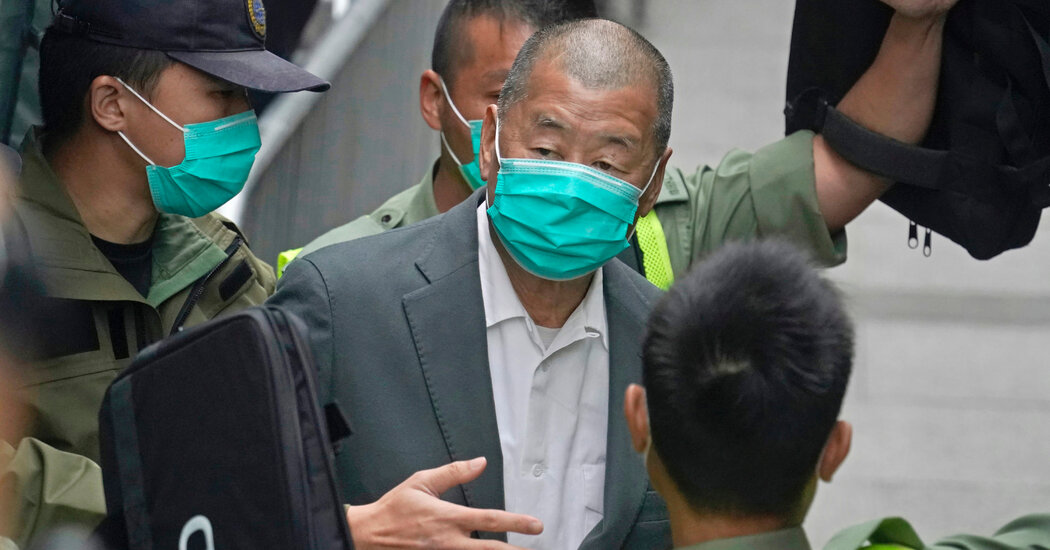Jimmy Lai, a Hong Kong pro-democracy media mogul, was sentenced to more than five years in prison on Saturday for fraud, a punishment that human rights activists denounced as the latest blow to freedom of expression in the city.
Mr. Lai, 75, was sentenced Saturday by Stanley Chan, a judge at the district court, on two counts of fraud for violating the terms of a lease contract related to Apple Daily, a pro-democracy newspaper he founded and which was forced to close last year when the authorities cracked down on it. Wong Wai-keung, director of Apple Daily’s parent company, Next Digital, was sentenced to 21 months for the same offense.
Mr. Lai’s sentence of five years, nine months — which human rights activists called disproportionately harsh for what amounted to a contractual dispute — was a further sign of the dwindling space for dissent and free expression in Hong Kong. A former British colony, it was promised in the terms of its handoff to China in 1997 protections for individual rights for 50 years under an arrangement known as one country, two systems.
Mr. Lai still faces several additional charges, including one under a broad national security law imposed on Hong Kong by Beijing that has cast a pall of fear over the city and resulted in jail terms for several prominent pro-democracy activists.
“I’ve never seen anything like this,” said Dennis Kwok, a former pro-democracy lawmaker in Hong Kong and a senior fellow at the Harvard Kennedy School, who questioned the framing of the case as fraud, as opposed to a civil dispute. “This is clearly a political prosecution.”
Mr. Lai is one of the most prominent pro-democracy figures to be targeted by Beijing’s crackdown on Hong Kong after it was rocked by a wave of antigovernment protests in 2019 and 2020. The authorities have detained opposition figures, forced news outlets to close and arrested and jailed protesters and activists.
Mr. Lai was charged in late 2020 for renting offices of Next Digital’s headquarters to his own consultancy firm, Dico Consultants, in violation of the leasing contract. (The lease designated the use of the building for news purposes only.) Pro-democracy activists and experts said the case appeared to involve a minor offense that would normally not result in prison time. Mr. Lai’s consultancy firm had occupied just 0.16 percent of the entire office complex.
But Judge Chan, during the sentencing, called the tiny percentage immaterial to the gravity of the case. He pointed to the intangible benefits of the arrangement, as well as the need for a strong deterrent, as justifications for a heavy sentence.
Mr. Kwok, the former pro-democracy lawmaker, said that it was unusual for a fraud case of this nature to be handled by prosecutors and a judge who worked mainly on national security cases. “In normal circumstances, it would result at most in a fine or damages,” he said.
Mr. Lai is still awaiting trial on charges filed in August 2020 of violating the sweeping and vaguely worded national security law that Beijing imposed on the city that year. In 2021, he was sentenced to 13 months in prison for participating in an annual vigil to commemorate victims of the 1989 crackdown on a peaceful protest in Tiananmen Square. Seven other pro-democracy activists were also convicted and sentenced in this case.
Against this backdrop, Mr. Lai’s sentencing on Saturday was not a surprise. For years, state-run Chinese news media and politicians have accused him of being a “black hand” colluding with foreign powers, and some have openly called for him to be punished.
Victoria Tin-bor Hui, a professor of political science at the University of Notre Dame, said that much of China’s anxieties over the protests in Hong Kong had been projected onto Mr. Lai.
“They’ve blamed so much of what’s happening in Hong Kong on him,” said Professor Hui, a Hong Kong native who has written extensively on the city’s democracy movement and Beijing’s crackdown. “They’re just going to do whatever it takes to ensure that he gets all the punishment they want to inflict on him.”
Ted Hui, a former pro-democracy lawmaker in Hong Kong, said the charges showed how China’s ruling Communist Party was taking a “comprehensive approach” to silence its critics. Mr. Lai’s sentence on fraud charges, he predicted, would be a prelude for further incursions on what remained of Hong Kong’s independent media.
“If they can use a highly technical case regarding a land contract, the regime can easily find another technical point regarding other media organizations,” Mr. Hui said. “They can copy the model and persecute other organizations.”


